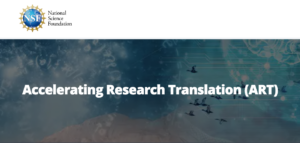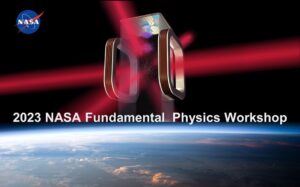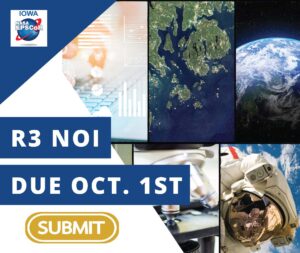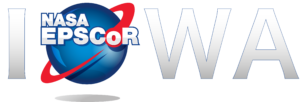|
Table 1 : NASA Research Focus Areas
|
|
RFA
|
Title
|
|
RFA-156
|
Lunar and Martian Sustainability of Additively Manufactured Materials
|
|
RFA-155
|
Development and Thermal/Mechanical Properties of Carbon Nanotube-Polymer Composites
|
|
RFA-154
|
Soft matter with specific focus on granular materials, colloidal science, rheology and other non-Newtonian Fluids
|
|
RFA-153
|
Development of an algorithm to invert 3D capacitance data to estimate 3D dielectric profile
|
|
RFA-152
|
Compact, deployable dual polarized low frequency (40-200 MHz) Log Periodic Dipole Array (LPDA) antenna for remote sensing of magnetic field of distribution inside large expulsions of plasma from the Sun’s corona.
|
|
RFA-151
|
Photogrammetric methods to measure dynamic motions of structures and validate dynamic models
|
|
RFA-150
|
An autonomous method of structural repair of spacecraft
|
|
RFA-149
|
Self healing metals in space environments
|
|
RFA-148
|
Investigation into technologies that allow for autonomous printing such as in-situ monitoring or self-cleaning technologies.
|
|
RFA-147
|
Investigation of the durability and wear resistance of ceramic parts produced by additive manufacturing.
|
|
RFA-146
|
Optimization of process parameters for ceramic feedstocks used in additive manufacturing in a micro or reduced gravity processing environment.
|
|
RFA-144
|
Investigation of microstructural properties of ceramic parts produced by additive manufacturing compatible with microgravity.
|
|
RFA-143
|
Research into technologies that can print muti-material parts in a singular platform.
|
|
RFA-142
|
Development of methods for in-orbit repair and maintenance of spacecraft using metal additive manufacturing.
|
|
RFA-141
|
Research on ways to improve the quality and consistency of metal AM part produced in microgravity.
|
|
RFA-140
|
Study solidification behavior in simulated microgravity environments.
|
|
RFA-139
|
Study the effect of processing temperatures for bound metal additive manufacturing with an emphasis on how temperature profiles may change in microgravity.
|
|
RFA-138
|
Research into the optimization of process parameters for bound metal deposition additive manufacturing with an emphasis on micro- or reduced gravitational effects.
|
|
RFA-137
|
Investigation of microstructural properties of metal parts produced by bound metal deposition additive manufacturing with an emphasis on micro- or reduced gravitational effects.
|
|
RFA-136
|
Development of new bound metal feedstocks for additive manufacturing using non-solvent based debinding.
|
|
RFA-135
|
Development of lunar, ISRU-based, “waterless” cementitious materials for construction
|
|
RFA-134
|
Lunar regolith simulants
|
|
RFA-133
|
Synthetic biology applications to construction of infrastructure elements
|
|
RFA-132
|
Creating instrumentation to verify structural properties/integrity in space
|
|
RFA-131
|
Reducing water content in concrete
|
|
RFA-130
|
Logistics studies for outfitting
|
|
RFA-129
|
Landing pad design
|
|
RFA-128
|
Outfitting
|
|
RFA-127
|
Concrete chemistry that will lend itself to applications on Earth, as well as space.
|
|
RFA-126
|
Lunar surface navigation using AI-assisted feature identification
|
|
RFA-125
|
Artificial Intelligence and Machine Learning Methods for Distributed Planning, Scheduling, and Execution Robust to Communication Delays
|
|
RFA-124
|
Quantum Characterizations of classical optical communications links
|
|
RFA-123
|
Fundamental physics requiring quantum sensing in space. Astrophysical, cosmological or fundamental physics concepts requiring quantum systems and sensors in space. Examples include gravitational wave observation, dark matter or dark energy searches, quantum foundations
|
|
RFA-122
|
Optical lattice clocks for space applications. Ultra-precise time keeping with low size, weight and power for deep space position, navigation and timing. Optical time transfer methods for dissemination of ultra precise clocks.
|
|
RFA-121
|
Quantum magnetometry for space systems: Spin- or defect-based magnetometers with wide bandgap semiconductors or laser cooled atom systems. Capabilities for low size, weight and power, radiation hardening and operation in extreme environments
|
|
RFA-120
|
Laser optical systems for cold atom sensors: Development of high power (>1 W), ultra narrow linewidth (<1 kHz) modular laser systems at 780nm or 852nm for integration with cold atom interferometers, cold atom inertial sensors and optical lattice clocks.
|
|
RFA-119
|
Quantum gravitational sensors: Robust cold atom sensors for space-based gravity gradiometry and gravimetry. Development of low size, weight and power systems utilizing high flux cold or ultra cold atom interferometers based on Rb, Cs or other alkali species for gravity or inertial sensing.
|
|
RFA-118
|
Develop autonomous systems for weld and Additive Manufacturing microscopy (e.g. polishing, etching, imaging)
|
|
RFA-117
|
In-space joining: enabling technology for the space economy
|
|
RFA-116
|
Integrated Computational Materials Engineering (ICME) & Multi-Physics Modeling Work-Flows for Optimization of and Detailed Computational Characterization of Existing Materials and for Novel Materials Discovery.
|
|
RFA-115
|
Technologies for autonomous collaborative planetary multi-robot systems
|
|
RFA-114
|
Quantum Computing as a Service
|
|
RFA-113
|
Novel QKD+Chaotic Communications
|
|
RFA-112
|
Quantum Characterizations of classical optical communications links
|
|
RFA-111
|
Low Cost Space Optical Communications
|
|
RFA-110
|
Orbital Angular Momentum for Space Communications
|
|
RFA-109
|
Deep Learning and Neural Networks for Optical Communications
|
|
RFA-108
|
Quantum Clock Synchronization
|
|
RFA-107
|
Quantum Optics
|
|
RFA-106
|
Trash Processing – Recycling and Resources Extraction from Space Logistical Waste
|
|
RFA-105
|
Development of reduced-volume acoustic liner concepts for subsonic aircraft and/or urban air mobility (UAM) applications
|
|
RFA-104
|
Phytoplankton Biodiversity of Inland Waters (South Africa – NASA BioSCape Project)
|
|
RFA-103
|
Low Earth Orbit Downmass Concepts: Development of small, unmanned re-entry vehicle concepts that provide small volume and downmass capabilities designed to deliver products created on the International Space Station to the Earth.
|
|
RFA-102
|
Building Bridges in Biosciences: Creating novel teams of researchers and technologists that collaborate to advance one or more of the following space life sciences topical areas: instrumentation, facilities, databases, artificial intelligences/machine learning, and mission concepts. Proposals must demonstrate benefit to both the astrobiology and space biology communities.
|
|
RFA-101
|
Inorganic Solid-electrolytes Processing and Scale-Up
|
|
RFA-100
|
Multifunctional Structural Materials for Extreme Space Environments
|
|
RFA-099
|
Improvements for Entry, Descent and Landing
|
|
RFA-098
|
Wireless Communication for Avionics and Sensors for Small Spacecraft Space Applications
|
|
RFA-097
|
Water Electrolysis: Includes proton exchange membrane and alkaline electrolyzers.
|
|
RFA-096
|
Utilization of Machine Learning Approaches for Efficient Estimation of Vector Magnetic Fields from SDO/HMI and SoHO/MDI
|
|
RFA-095
|
Transfer Function of Nondestructive Evaluation Response of Cracks and Notches
|
|
RFA-094
|
Tissue and Data sharing for space radiation risk and mitigation strategies
|
|
RFA-093
|
THz limb sounding of the thermosphere
|
|
RFA-092
|
Thermal Batteries: Includes new cell chemistries and spacecraft applications.
|
|
RFA-091
|
The dense, warm interstellar medium
|
|
RFA-090
|
Testing: Ground testing capabilities for small satellites in a realistic environment to perform; Small Satellite inspection flight hardware qualification testing; Small Satellite docking demonstration in a realistic environment
|
|
RFA-089
|
Technologies That Enable Large Swarms of Small Spacecraft
|
|
RFA-088
|
Submm-wave and IR polarimetry for cloud remote sensing
|
|
RFA-087
|
Studying phytoplankton ecology and community composition, both in situ and derived from ocean color remote sensing.
|
|
RFA-086
|
Stereo imaging from space
|
|
RFA-085
|
Spearheading big data analysis using satellite ocean color remote sensing products and field measurements, and create and validate bio-optical algorithms.
|
|
RFA-084
|
Spacecraft Battery Design, Test and Operation.
|
|
RFA-083
|
Space radiation sex-differences
|
|
RFA-082
|
Solid-state electrolytes including polymer/composite polymer electrolyte
|
|
RFA-081
|
Solar power from the cell to the array level, ground and in-space testing of photovoltaic systems, mission support of solar powered spacecraft
|
|
RFA-080
|
Societal ramifications of ethical decision making
|
|
RFA-079
|
Small Spacecraft Lunar Communications and Navigation Networks
|
|
RFA-078
|
Small Spacecraft High-Bandwidth Interoperable Space Layer and Networking for Cislunar and Deep Space
|
|
RFA-077
|
Seismometry to meteorology and other science measurement preparation
|
|
RFA-076
|
Satellite and Ground Communication systems
|
|
RFA-075
|
Safety of Electro-mechanical Powertrains for Electrified Vertical Takeoff and Landing (eVTOL) Vehicles
|
|
RFA-074
|
Research Fellow for Advanced Manufacturing of Sensors and Electronics
|
|
RFA-073
|
Remote Sensing of Land Use/Cover Changes, Vegetation (forestry, agriculture), Fires
|
|
RFA-072
|
Propulsion : Develop propulsion technology for small satellite proximity operations maneuvers; Provide propulsion performance to meet inspection time and coverage requirements; Ensure propulsion fault tolerance for reliability
|
|
RFA-071
|
Printed sensors (environmental, biosensors, structural health monitoring)
|
|
RFA-070
|
Portable, non-ionizing radiation based, high resolution disease detection imaging
|
|
RFA-069
|
Policy/Standards/Law Making Assessment
|
|
RFA-068
|
Pilot studies to demonstrate the utilization of full systems biology approaches in addressing human spaceflight risks
|
|
RFA-067
|
Pilot studies to adopt terrestrial precision health solutions for astronauts
|
|
RFA-066
|
Phytoplankton pigments and derivation of phytoplankton composition
|
|
RFA-065
|
Orchestrating multiple community driven efforts to standardize data collection, analysis, and management approaches; an example technical manual can be found here: https://repository.oceanbestpractices.org/handle/11329/1705
|
|
RFA-064
|
Novel thermal management of the propulsion components and/or of the propulsion system.
|
|
RFA-063
|
Nondestructive Evaluation of Additive Manufacturing
|
|
RFA-062
|
Multi-Physics Modeling: Thermal, fluid dynamics, electrochemical modeling for a wide range of reactor and device applications.
|
|
RFA-061
|
Molten Regolith Electrolysis: High temperature electrolysis of lunar and Martian soils to generate oxygen gas and metals.
|
|
RFA-060
|
Molecular clouds and star formation
|
|
RFA-059
|
Modeling, analysis, and support from field data for Venus related seismometer
|
|
RFA-058
|
Model Zoo” of pretrained biological models for transfer learning on space biology datasets
|
|
RFA-057
|
Mineralogy, geochemistry, and water-rock interactions
|
|
RFA-056
|
Materials development for additive manufacturing
|
|
RFA-055
|
Manufacturing and integration of low-cost, robust, reusable thermal protection systems with high temperature capability
|
|
RFA-054
|
Machine Learning-Based Detection of Flood Extent and Impacts
|
|
RFA-053
|
Lunar manufacturing of solar cells and sensors
|
|
RFA-052
|
Low temperature performance and thermal management
|
|
RFA-051
|
Li-ion and beyond Li-ion battery technologies such as metal-air
|
|
RFA-050
|
LEO manufacturing support (additive, advanced materials, thin layer processing)
|
|
RFA-049
|
Laser Communication
|
|
RFA-048
|
Inflammasome role in radiation-associated health impacts
|
|
RFA-047
|
In Situ Monitoring of Additive Manufacturing
|
|
RFA-046
|
Improved Understanding of Solar Microflares using Data Science
|
|
RFA-045
|
High Temperature Batteries: Includes primary and secondary cells up to 460oC.
|
|
RFA-044
|
High reliability and robustness for safety-critical propulsion systems including but not limited to a) arc fault protection; b) EMI/filtering; c) fault tolerant architectures; d) power management.
|
|
RFA-043
|
High power density power grids, power electronics, motors, and electromechanical powertrains
|
|
RFA-042
|
High capacity anode and high capacity/high voltage cathode
|
|
RFA-041
|
GNSS radio occultation (RO) for PBL
|
|
RFA-040
|
GNC: Mature guidance, navigation, and controls algorithms and hardware applied to small satellites performing inspection and rendezvous maneuvers; perform statistical studies and simulations to formulate damage probability metrics in support of a damage aware control system
– Mature Verification &Validation of GNC algorithms for RPOC capabilities
– Innovative reliable flight-ready low-cost sensors to enable rendezvous and proximity operations
|
|
RFA-039
|
Fuel Cells POC: Includes proton exchange membrane and alkaline fuel cells.
|
|
RFA-038
|
Formation of molecular clouds
|
|
RFA-037
|
Explore and document the parameters in play in the transition of ethical decision making from humans to autonomous systems
|
|
RFA-036
|
Evaluation space capsule and spacesuit activity in stable and fit lower or upper extremity amputees and compare their responses to non-amputee fit individuals
|
|
RFA-035
|
Electrochemical Sensors: Includes electrochemical impedance spectroscopy, dielectric spectroscopy.
|
|
RFA-034
|
Earth Science Remote Sensing
|
|
RFA-033
|
Document the Current State-of-the-Art/Practice of Ethical Decision Making by Humans in Operational Systems
|
|
RFA-032
|
Document legal ecosphere of ethical decision making in off-nominal scenarios
|
|
RFA-031
|
Development of Uranium based Fuels for Nuclear Thermal Rocket Propulsion
|
|
RFA-030
|
Development of materials for extreme environments
|
|
RFA-029
|
Development of high-temperature refractory alloys and coatings
|
|
RFA-028
|
Development of Coating Materials for Nuclear Thermal Rocket Applications
|
|
RFA-027
|
Development of Characterization Techniques to Determine Rate and Temperature Dependent Composite Material Properties for the LS-DYNA MAT213 Model
|
|
RFA-026
|
Development of advanced soft magnetic materials for high-power electronic systems
|
|
RFA-025
|
Development and elaboration of Functional aids and testing paradigms to measure activity for use by parastronauts during spaceflight
|
|
RFA-024
|
Design, Development, & Implementation of Highly Automated / Autonomous Systems to abide by ethical decision making policy, standards, guidelines, and laws
|
|
RFA-023
|
Current & projected autonomous performance capabilities and limitations
|
|
RFA-022
|
Compound screening techniques to assess efficacy in modulating responses to radiation exposure
|
|
RFA-021
|
CO2 Reduction: Electrochemical conversion of CO2 to various products including carbon monoxide and ethylene.
|
|
RFA-020
|
Chemical Heat Sources: High specific enthalpy systems including lithium-sulfur hexafluoride reactors for long-lived heat for planetary and lunar missions
|
|
RFA-019
|
Charting a successful course for field campaigns on behalf of NASA missions, including coordinating and supporting laboratory analysis of field samples (particle absorption, carbon) and data processing and collection and analysis of plankton images using in-flow imaging cytometry.
|
|
RFA-018
|
Beyond Lithium-Ion Cell Chemistries: Includes fluoride-ion, magnesium-ion, calcium-ion cell chemistries.
|
|
RFA-017
|
Balloon-based remote sensing of geophysical activity on Venus using infrasound
|
|
RFA-016
|
Bacteria, Archaea, and Fungi are capable of altering terrestrial materials as a way to acquire organic carbon and or trace nutrients.
|
|
RFA-015
|
Autonomy and GNC for multi-agent systems including formation flying, and spacecraft swarms
|
|
RFA-014
|
Autonomous System-Level Fault Diagnosis and Mitigation
|
|
RFA-013
|
Astrophysics Research and Analysis, and Technology Development
|
|
RFA-012
|
Artificial Intelligence (AI)/Machine Learning (ML) for Small Spacecraft Swarm Trajectory Control
|
|
RFA-011
|
Arctic phytoplankton ecology, ocean color remote sensing and optical properties, particularly the Chukchi Sea.
|
|
RFA-010
|
Application of Machine Learning to LNOx Estimation from Satellite Lightning Mappers
|
|
RFA-009
|
Application of advanced materials and manufacturing to achieve above.
|
|
RFA-008
|
Analytical and methodological pipelines that investigate the stoichiometry, elemental abundances, fluid chemistry and size distribution patterns of entrained particles in order to determine the probability for biological origin.
|
|
RFA-007
|
Analytical and methodological pipelines that investigate organic molecular patterns to identify the source and physicochemical history of naturally occurring suites of compounds and developing metrics that can differentiate between biological and abiotic reaction products.
|
|
RFA-006
|
Alternative materials for magnetized liner z-pinch implosions
|
|
RFA-005
|
Algorithm development for, and applications of, optical/thermal imagery for studying freshwater and coastal regions
|
|
RFA-004
|
Self-Healing/Resilient Multi-Agent Systems
|
|
RFA-003
|
Advanced Primary Battery Cells: Includes Lithium carbon monofluoride, lithium thionyl chloride, lithium sulfur dioxide, lithium iron sulfide, high temperature cells, ultra-low temperature cells.
|
|
RFA-002
|
Advanced Lithium-Ion Battery Cells: Wide operating temperature, low temperature, high temperature, high specific energy/high energy density cells, specialized electrolytes
|
|
RFA-001
|
Additive manufacturing and additive manufacturing of electronics
|

 Iowa NASA EPSCoR and Iowa Space Grant Consortium are pleased to announce Dr. Sara D. Nelson as the Iowa Space Grant Consortium (ISGC) and Iowa NASA EPSCoR Director effective January 1, 2023. Please join us in welcoming Dr. Nelson! Sara served as the ISGC and Iowa NASA EPSCoR Interim Director. Prior to the interim position, Sara served as the Assistant Director for Education and Outreach. Nelson also holds a faculty position at the
Iowa NASA EPSCoR and Iowa Space Grant Consortium are pleased to announce Dr. Sara D. Nelson as the Iowa Space Grant Consortium (ISGC) and Iowa NASA EPSCoR Director effective January 1, 2023. Please join us in welcoming Dr. Nelson! Sara served as the ISGC and Iowa NASA EPSCoR Interim Director. Prior to the interim position, Sara served as the Assistant Director for Education and Outreach. Nelson also holds a faculty position at the 

